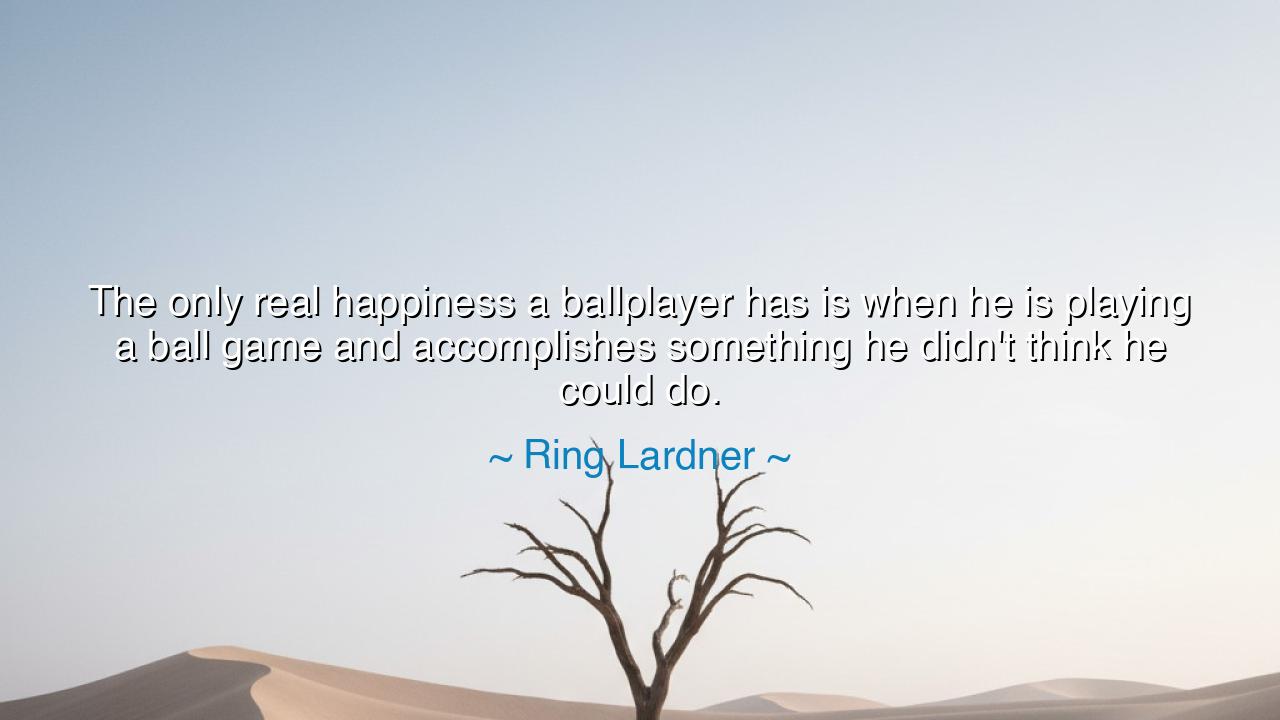
The only real happiness a ballplayer has is when he is playing a
The only real happiness a ballplayer has is when he is playing a ball game and accomplishes something he didn't think he could do.






The American writer and humorist Ring Lardner, whose pen captured both the poetry and tragedy of sport, once wrote: “The only real happiness a ballplayer has is when he is playing a ball game and accomplishes something he didn’t think he could do.” Beneath these humble words about baseball lies a profound reflection on the nature of happiness, achievement, and self-discovery. For Lardner was not merely describing the joy of the athlete — he was describing the human spirit itself, which finds its truest fulfillment not in comfort or reward, but in the moment of overcoming.
The origin of this quote arises from Lardner’s deep familiarity with the world of baseball, which he covered not only as a journalist but as a philosopher of the game. To him, baseball was a mirror of life — filled with failure, repetition, and fleeting triumph. He saw in its rhythm the essence of human striving: the endless cycle of effort, defeat, and redemption. When he wrote that the only real happiness for a player comes from doing what he thought he could not do, he revealed an eternal truth — that joy is born not of ease, but of effort; not of success given, but of success earned through struggle.
To accomplish something you didn’t think you could do — that is the moment when the soul awakens. It is when the mind and body unite in defiance of doubt. The athlete who stands trembling before the pitch, the artist before the canvas, the thinker before the problem — all face that same wall of limitation. And when they break through it, even for an instant, they touch something divine. Lardner understood that this moment of transcendence, however brief, is the heart of all true happiness — not the trophies, not the applause, but the quiet astonishment of discovering one’s own potential.
We may see this truth reflected in the story of Babe Ruth, the great slugger who began his career as a troubled boy in a reform school. Few expected greatness from him, least of all himself. Yet every home run he struck was not merely a feat of strength, but an act of faith — proof that even the castaway can rise. Ruth’s joy was not in his fame, but in the thrill of doing what once seemed impossible: transforming hardship into triumph. Like Lardner’s ballplayer, he found his deepest satisfaction not in recognition, but in self-overcoming.
There is a lesson here that reaches beyond the diamond. Each of us is a ballplayer in the field of life. Our games are different — some play with words, some with hands, some with dreams — but the measure of our happiness remains the same. It is found not in what is easy, but in what tests the limits of our courage and patience. The worker who finishes a task once thought too difficult, the student who grasps a truth after many failures, the parent who perseveres through struggle — all know that same sacred joy. They have felt the quiet victory of proving themselves to themselves.
Lardner’s wisdom also reminds us that happiness is fleeting, as all moments of greatness are. The ballplayer’s glory lasts only for the length of the game; the artist’s masterpiece fades with time. Yet that does not diminish its worth — it enhances it. For in that fleeting instant, one lives wholly, without fear or pretense. It is the kind of joy that cannot be bought or taught, only earned through daring to step beyond comfort. Thus, happiness is not a state to be possessed but a moment to be created, again and again, each time we rise to challenge ourselves anew.
To live according to this truth is to cultivate a spirit of courage and persistence. Do not chase happiness as a reward — let it come as the byproduct of your striving. Engage deeply in your craft, your calling, your daily labor. Seek those moments when you surprise yourself, when you do what once seemed beyond your reach. That is where your truest joy lies. For as Lardner knew, happiness does not dwell in the end of the journey, but in the act of becoming — in the swing, the pitch, the leap of faith that turns doubt into discovery.
So remember this teaching, passed down through the timeless wisdom of the game: the only real happiness is born of courage — the courage to try, to fail, and to rise again. When you accomplish something you thought you could not, you have tasted the essence of life itself. Whether on the field, in the workshop, or in the heart’s private arena, that is the victory that matters — the one that changes who you are. Play your game, strive beyond your fear, and happiness will find you, as it finds all who dare to believe in more than they once thought possible.






AAdministratorAdministrator
Welcome, honored guests. Please leave a comment, we will respond soon